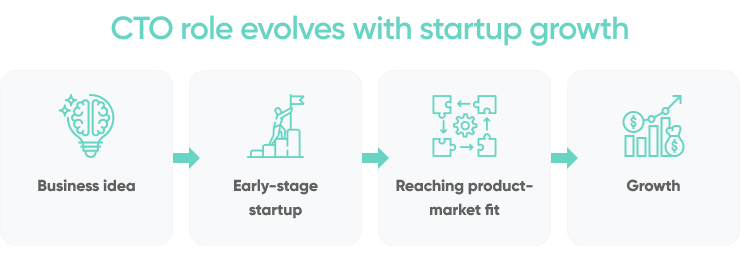Every tech startup or company needs a CTO to handle the tech side of the company. But what roles, responsibilities, and duties does a CTO really carry?
CTO deals with all the tech needs of a company by ensuring the controlled use of resources while aligning everything with the vision of the company. In this article we look closer how CTO role evolves with startup growth and what the CTO responsibilities are critical in each stage.
What role does a CTO play at a tech startup?
CTO roles and their responsibilities vary from company to company due to the fact that the job title usually means different things in all companies. The expectations of never the same because all the companies possess varying technological goals, which are to be fulfilled by strategic planning and executive decisions of their Chief Technology Officer.
This role needs certain skills that fit the needs of a particular company. Overall, CTO is a general term that cannot be associated with certain duties or responsibilities because there is a lot of room for flexibility in this role.
CTO role evolves with startup growth
A CTO is a decision-maker and a strategic planner who ensures the technological growth and management of your company. Despite his technical skills, he is less of a hands-on person and more of a decision-maker with authority to regulate other technical employees who get the job done under his command.
Moreover, the roles and responsibilities are also dependent on the type of company or startup. If a startup hires a CTO on an initial stage, then he might need to get involved in fixing the code and actual technical problems by himself.
The duties can also be shifted at various stages of startup growth. For Example, a startup might hire some technical staff which will most likely change the responsibilities of a CTO. Now CTO can direct the technical staff with his decisions to get the job done.

Business idea
In the initial, pre-seed stage, startups are building product prototype. CTO often works with UX designers for designing prototypes at this stage by giving their technical assistance throughout the process. CTO works with the engineering team to ensure the most reliable development practices for developing the core product.
Following are the responsibilities and requirements for a CTO where his practical involvement is important for a solid prototype:
CTO Responsibilities
- Design and develop our core product which will [...]
- Rapidly iterate and test first version prototypes by collecting client feedback
- Make architecture decisions to ensure a strong, stable, and scalable product
- Building out our tech stack and engineering hiring plan
- Work with engineering team to increase their expertise and understanding of best development practices
CTO Requirements
- Experience working in an early-stage successful tech start-up
- A strong product sense and can build engaging tech for customers
- Ability to conduct technological analyses and research
- Strong interpersonal skills and the ability to share/collaborate with peers
Early-stage startup
Once a startup has its MVP with a few early customers along with their feedback, then CTO can make further arrangements to improve their product based on the customer’s review.

Now the CTO becomes more of a customer advocate with management duties to keep everything on track. He makes wise decisions to improve the product with the help of his technical development team that continuously improves the product. Responsibilities at this stage:
CTO Responsibilities
- Partner with CEO to define, prioritize and realize product roadmap
- Managing in-house engineering team, contracted development partners, and head the integrations of partner API's to our platform
- Driving performance, efficiency and effectiveness of engineering and product development team
- Discover and implement new technologies that yield competitive advantage
CTO Requirements
- Significant experience in software architecture and personally building digital products from early-stage through to scaling and maturity, including [...] experience
- You’ve managed, mentored, and inspired a small team of engineers providing architectural guidance, code reviews, etc.
- Deep knowledge of full-stack modern development practices (ex: DevOps, APIs)
- Experience in project management to ensure timely deliverables
Reaching product-market fit / consolidation
The CTO role starts maturing at this stage with more management and decision-making duties. He has multiple development teams that work on the enhancement of the product under his command. He continuously tracks progress while paying attention to the arising security issues.
A primary responsibility of the CTO is the direction and management of software products as they relate to their core tasks. Other practical tasks such as QA and coding are now carried out by other team members in the technical department.
The Head of the Engineering department is also active in designing product architecture while looking for new strategies popping up in the industry.
This is a visionary stage where CTO collaborates with the CEO to make strategic decisions about the product roadmap with the following responsibilities and requirements.
CTO Responsibilities
- Partner with CEO to define product vision and strategy
- Aligning and providing feedback on the product roadmap, work closely with product to decide on prioritization, resource allocation, and timelines
- Leading all aspects of the development lifecycle, including requirements analysis, strategic planning, design/architecture, execution, deployment, and maintenance
- Building quality assurance and data protection processes, ensuring all technology practices adhere to regulatory standards
CTO Requirements
- Prior CTO / Head of Engineering / technical visionary experience for a [...] startup, preferably with a track record of one or more successful exits
- Data-driven to evaluate product-market fit and other aspects of product performance, able to identify insights that will influence future decisions
- Have a proven understanding of best engineering practices for the full software development life cycle (SDLC), including coding standards, code review, source control, build, test, deploy, and operations
- An effective leader and team-player who knows how to hire and manage the right talent to scale the Engineering team
Growth
When a startup starts to grow then, CTO becomes more involved in leadership and management. The startup starts to scale by collaborating with many companies, and CTO is making collective efforts with the help of the development team to ensure that roadmap is being followed.
CTO develops new frameworks to balance the technical resource usage. He needs to ensure that all resources are being efficiently and securely used. He also uses his soft skills to keep development and engineering teams motivated.

CTO is responsible for developing a reliable culture in the organization where all team members are bound to comply with the set rules and deadlines. Leadership skills become crucial at this stage.
Following are the responsibilities and requirements for a CTO at the growth stage where soft skills become handy:
CTO Responsibilities
- Communicate technology strategy to partners and investors
- Ensuring technologies are used efficiently, profitably, and securely
- Developing a strategy and framework for allocating resources effectively in line with vision, in a way that motivates and inspires team members
- Setting goals that help meet the organization’s needs, set a high standard for success, and draw on the strength of team managers
- Building a technology leadership team that can expertly manage their own teams, develop a strong and focused culture, and be responsive to the organization’s needs
CTO Requirements
- 10+ years’ experience leading and being successful in tech industry
- Excellent leadership, team building, and management skills, including a track record of coaching and mentorship
- Strong communication skills with the ability to present a technology vision confidently in a way that motivates others both internally and externally
- Understanding of budgets and business-planning
- Leadership and organizational abilities
- Strategic thinking
Conclusion
A startup passes through different phases before it reaches an elevated growth stage. CTO duties differ at every stage according to the changing dynamics of a startup.
However, the role becomes more mature after passing every phase, but at the first few stages, CTO needs to be practical, while the last stage demands leadership and management skills.

